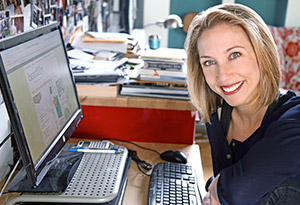Poet Samantha Reynolds' 6 Rules of Writing

Photo: Peter McCormack
On her lively site, bentlily.com, Samantha Reynolds defines poetry as "(1) a suitcase of invisible mementos, (2) the words we use to explore our sense of wonder, and (3) an enchanting way to trick yourself into being present." This final tenet of her devoted poetry practice—Reynolds, 37, writes one poem a day—is key. "Mindfulness is the heart of my work," she says. "The poems are a tool to help me notice the details of my life." Here, Reynolds—whose collection, Bentlily, is available on her site—explains how simple the process of composing verse can be.
Find a place you've never been before, where you can sit, uninterrupted, for an hour. The more unfamiliar the environment, the better for arousing creativity.
Close your eyes and hold your breath for ten seconds. The moment you begin not breathing, all you can think about is the acute absence of breath. As soon as you take a breath, you will find yourself briefly, exquisitely, enveloped in awareness.
Pick a nearby object and stare at it. Resist seeing it as you have before. Ask yourself, What does it really remind me of? until your own version of it emerges.
Consider how the object makes you feel. Maybe it's a mug that reminds you of your late grandmother's, and it makes you feel giddy, as though she's in the room.
Note three qualities of the object, and be as specific as you can. Try giving it human characteristics (perhaps the mug is the color of old teeth, or as round as a baby's face) or emotions (maybe it's lonely). You can find love in a ceiling fan and grief in the shape of a pen.
Return to the object. Let your thoughts about it wander freely—and follow them devotedly with your pen. Compose your observations in regular sentences, but then go back, removing unnecessary words and experimenting with the length of each line. Try to end each line with the strongest words or images. Feel free to abandon proper punctuation.
You now have a first draft. Read it out loud to hear its rhythm; keep going until that rhythm feels right in your bones.
Put the poem away. Don't look at it until tomorrow—at which time you might shift a word or phrase, delete a line or two.
More on Ways to Spark Your Creativity
Find a place you've never been before, where you can sit, uninterrupted, for an hour. The more unfamiliar the environment, the better for arousing creativity.
Close your eyes and hold your breath for ten seconds. The moment you begin not breathing, all you can think about is the acute absence of breath. As soon as you take a breath, you will find yourself briefly, exquisitely, enveloped in awareness.
Pick a nearby object and stare at it. Resist seeing it as you have before. Ask yourself, What does it really remind me of? until your own version of it emerges.
Consider how the object makes you feel. Maybe it's a mug that reminds you of your late grandmother's, and it makes you feel giddy, as though she's in the room.
Note three qualities of the object, and be as specific as you can. Try giving it human characteristics (perhaps the mug is the color of old teeth, or as round as a baby's face) or emotions (maybe it's lonely). You can find love in a ceiling fan and grief in the shape of a pen.
Return to the object. Let your thoughts about it wander freely—and follow them devotedly with your pen. Compose your observations in regular sentences, but then go back, removing unnecessary words and experimenting with the length of each line. Try to end each line with the strongest words or images. Feel free to abandon proper punctuation.
You now have a first draft. Read it out loud to hear its rhythm; keep going until that rhythm feels right in your bones.
Put the poem away. Don't look at it until tomorrow—at which time you might shift a word or phrase, delete a line or two.
More on Ways to Spark Your Creativity



